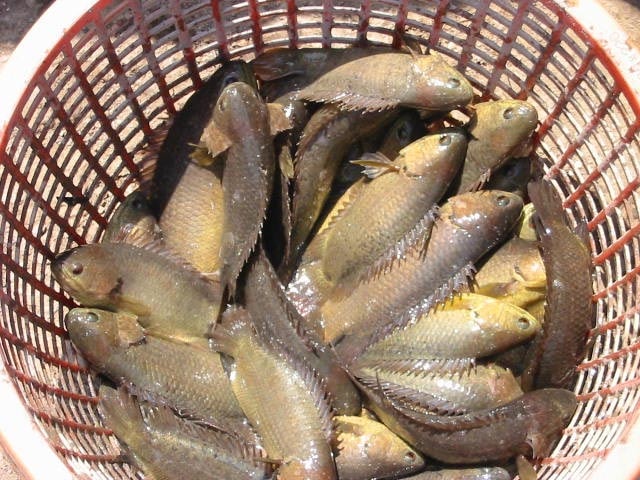About Bau Non, remember the perch...
As the common “rice granary” of 5 communes: Xuan Hoa, Nam Anh, Nam Xuan, Van Dien and Nam Thanh (Nam Dan), Bau Non is also famous for its specialty perch. In September and October of the lunar calendar, when the rice plants begin to dry their leaves, the weather is cold, the gentle wind carries the white rice leaves on the surface of the fields, making them an abundant food source for shrimp and fish. The gluttonous perch are thus nourished, accumulating fat reserves for the winter. At this time, the fish are fat and yellow, and the fin bones are very soft.
 |
Bau Non is a large lake formed by the dead valley of the ancient Lam River, about several thousand hectares wide. In the past, in the spring and summer, the water in Bau Non was shallow enough to grow rice in the coastal areas, but in the fall and winter, the water was high and the waves were big. In addition to growing rice, people living along the shore also caught natural fish in the lake. During the reign of King Le Than Tong (1635 - 1642), a retired mandarin from Huong Lam commune, Huong Lam Marquis Nguyen Van Lam, found that Bau Non was more profitable for agriculture than for fishing. Moreover, every year during the rainy season, Bau Non often flooded, causing disasters. Therefore, he submitted a petition to the court asking for permission to clear Bau Non for rice cultivation.
With the king's approval, he mobilized the people to dig a canal from Bau Non to the mangrove canal of Hung Nguyen district to flow into the Lam River. Thanks to that, today Bau Non has become a fertile rice field. The contribution of Huong Lam Hau to the district's economy is truly great. In Bau Non, there is a famous delicious perch breed, so much so that its reputation spread to the capital Thang Long. A servant in the palace reported to King Ly Cao Tong (1178 - 1210), the king ordered Non Giang commune to bring Bau Non perch to Thang Long to present to the king. Bringing perch from Non Giang commune to the capital was extremely difficult, not much less than Mai Thuc Loan had to carry fabric to pay tribute in the past.
At that time, in the royal palace there was a maid named Le, from Non Giang commune, who specialized in serving the king's lunch, callednoon time(meaning the lunch lady). Seeing that the villagers were suffering too much in offering fish to the king, on one occasion when she returned home, she discussed with the villagers to dig a pond and put cow dung in it, then put fish in the pond to raise for a while before transporting the fish to the capital. Fish that ate cow dung were no longer as fat as when they were in the rice fields, their bones were hard, and their meat was dry. When eating the fish, they found it was not as delicious as before. The king asked the reason, she said that now that rice was grown a lot, a lot of cow dung had to be added to make the rice grow better, the fish ate cow dung so they were thin, and she asked to forgo the offering to ease the people's suffering, the king agreed. When she died, the people of Non Giang commune brought her coffin back to their hometown for burial at Cup hill near her old residence and built a temple to worship her to remember her merits to the villagers, called Mu Ngo temple and named the field where the fish pond was raised before being offered to the king Mu Ngo land. Nowadays, Bau Non is the common "rice granary" of 5 communes: Xuan Hoa, Nam Anh, Nam Xuan, Van Dien and Nam Thanh, because the land here is fertile with green rice and corn all year round, but the people here still do not forget the fishing profession. In September and October of the lunar calendar, when the rice plants begin to dry their buds, the weather is cold, the gentle wind carries the white rice buds on the field surface, making it an abundant food source for shrimp and fish. The gluttonous perch are thus nourished, storing fat for the winter. At this time, the fish are fat and golden, and the fin bones are very soft. When the fish are caught, people use bamboo skewers to thread them into skewers and grill them on a charcoal stove. The fish is golden brown, shiny and smells so fragrant that even the most elegant person cannot hide their hunger. After a hard day's work, in the evening, gathering around the warm red fire, enjoying the taste of grilled perch with garlic fish sauce, accompanied by white wine, while grilling and eating, even the king would have to leave his throne to "join in". Grilled perch braised in soy sauce and turmeric leaves is also a dish loved by many people because of its very unique flavor. Or perch cooked with mustard greens and chrysanthemum greens, both nutritious and delicious, suitable for the taste of even the most "difficult" person.
Tran Hai






